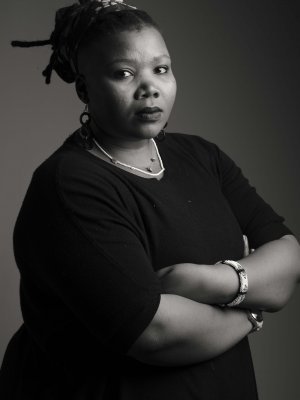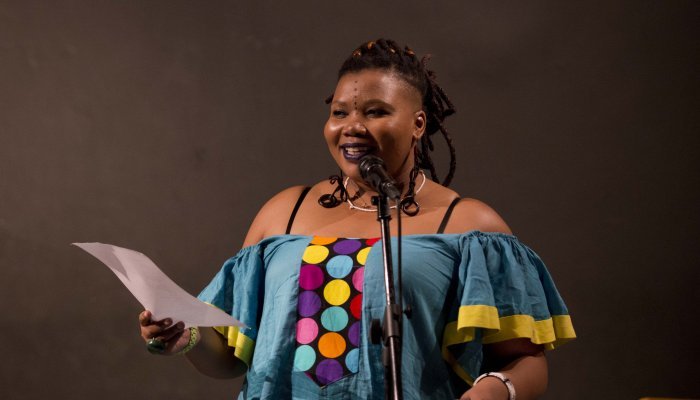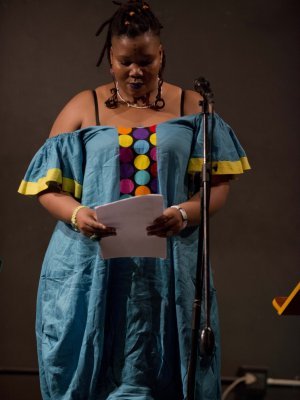Vangile Gantsho has emerged as one of the most important new voices in poetry. But those who are paying attention also know that she's making a name for herself as one of the improvisers of the poetry-meets-jazz genre.
At a recent performance at The Orbit in Johannesburg, Gantsho was joined on stage by the duo of Yonela Mnana at the piano and Lex Futshane on double bass. Where Mnana's playing suggests a sustained whisper, Futshane's takes full advantage of the big bold sound of his instrument. As always Myesha Jenkins provides an educated introduction to the poets that she features in her jazz-meets-poetry evenings at The Orbit.
Gantsho joins a long line of innovators, those whose lyrics were written as much for the page as for the jazz format. This includes Nikki Giovanni and Gil Scott-Heron, whose The Revolution Will Not Be Televised remains one of the most powerful soundtracks for freedom. These lines from Scott-Heron are still as riveting:
There will be no pictures of you and Willie May
Pushing that shopping cart down the block on the dead run,
Or trying to slide that color television into a stolen ambulance.
NBC will not be able predict the winner at 8:32
Or report from 29 districts.
Gantsho brings to her lyrics a disarming simplicity. But as anyone who's ever listened closely to My Baby Just Cares For Me or even the enduring classic Autumn Leaves, the great lyricists know how to say so much more than a first hearing of the lyrics might suggest. It is no surprise then that she calls herself a poet and an activist. Because these other cultural innovators were impatient to change the world.
She says that her earliest memories are of road trips in the family bakkie, a red one in which her father always played music. At home the music that played as a backdrop to chores in the kitchen was that of Miriam Makeba and Caiphus Semenya. But there was something else too that she could hear, what she calls “whispered politics and laughing men”. But if these were the sounds of her youth, she says her own taste has steered her towards Thandiswa Mazwai, Mthwakazi, Bongeziwe Mabandla and Indwe.
When asked about her relationship with jazz, she pauses and adds, like so many before her, that she's not even sure she knows what jazz is. But she's quick to add “in the same way that I cannot tell you what exactly a poem is”. Clearly Gantsho grasps that labels solve as many problems as they create. But she adds: “Only that I know what I feel. There is music I can write to, and I have found this music to make for interesting conversations with my poetry. When writing, I may listen to Bobo Stenson or Nduduzo Makhathini. When preparing a space for creativity, I may listen to Sibongile Khumalo, Nomfundo Xaluva, Nina Simone or Zim Ngqawana.”
All these are musicians who in many ways defy both convention and categorisation. They insist on being true to themselves. And yes there is always a cost for such authenticity but the beauty of the music more than makes up for it.
Gantsho concludes, “Interestingly, I have always been the black girl who couldn't dance, perhaps that is why my writing does not follow a particular obviously identifiable rhythm. As a result, the first time I performed with a jazz band, I nearly collapsed during rehearsals. It was Gloria Bosman who calmed me down and eased me into a conversation with the music.”
Gantsho has been published in publications including The Agenda (2004), Sabel (2010), Wits Press (2011), Botsotso (2015), New Coin (2017) and Illuminations (2017). Her first collection was called Undressing in front of the window (2015) and in it are to be found the seeds of much that will soon blossom as major poetry.








